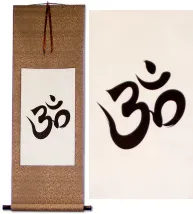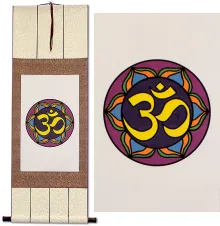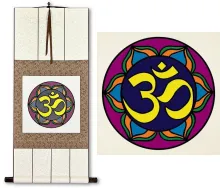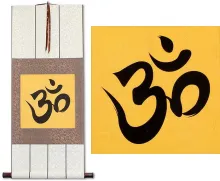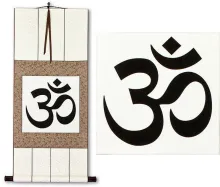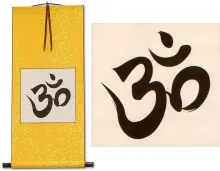Many custom options...
And formats...

Hindu in Chinese / Japanese...
Sorry! There's currently no match for Hindu in the calligraphy database...
If you want a special phrase, word, title, or proverb, feel free to contact me, and I'll translate your custom calligraphy idea for you.
Below are some entries from our dictionary that may match your hindu search...
| Characters If shown, 2nd row is Simp. Chinese |
Pronunciation Romanization |
Simple Dictionary Definition |
竜 see styles |
lóng long2 lung ryou / ryo りょう |
More info & calligraphy: Dragon / Emperor Symbol(1) dragon (esp. a Chinese dragon); (2) naga; semi-divine human-cobra chimera in Hindu and Buddhist mythology; (surname, female given name) Ryō |
龍 龙 see styles |
lóng long2 lung riyou / riyo りよう |
More info & calligraphy: Dragon(out-dated kanji) (1) dragon (esp. a Chinese dragon); (2) naga; semi-divine human-cobra chimera in Hindu and Buddhist mythology; (personal name) Riyou A dragon, dragon-like, imperial; tr. for nāga, which means snake, serpent; also elephant, elephantine, serpent-like, etc., cf. 那. |
印度 see styles |
yìn dù yin4 du4 yin tu indo いんど |
More info & calligraphy: India(ateji / phonetic) (kana only) India; (place-name) India 印特伽; 身毒; 賢豆; 天竺 Indu (meaning 'moon' in Sanskrit), Hindu, Sindhu; see also 信度 and 閻浮 India in general. In the Tang dynasty its territory is described as extending over 90, 000 li in circuit, being bounded on three sides by the sea; north it rested on the Snow mountains 雪山, i. e. Himālayas; wide at the north, narrowing to the south, shaped like a half-moon; it contained over seventy kingdoms, was extremely hot, well watered and damp; from the centre eastwards to 震旦 China was 58, 000 li; and the same distance southwards to 金地國, westwards to 阿拘遮國, and northwards to 小香山阿耨達. |
吠陀 see styles |
fèi tuó fei4 tuo2 fei t`o fei to Beida ヴェーダ |
More info & calligraphy: Veda(kana only) Veda (san:) Veda, v. 韋. |
土星 see styles |
tǔ xīng tu3 xing1 t`u hsing tu hsing dosei / dose どせい |
More info & calligraphy: Saturn{astron} Saturn (planet) 賒乃以室折羅 Śanaiścara. Saturn. Śani, the Hindu ruler of the planet, was "identified with the planet itself ".[Eitel.] |
薩蒂 萨蒂 see styles |
sà dì sa4 di4 sa ti |
More info & calligraphy: Sadie |
カーマ see styles |
kaama / kama カーマ |
More info & calligraphy: Carma |
ラーマ see styles |
raama / rama ラーマ |
More info & calligraphy: Rahmah |
因陀羅 因陀罗 see styles |
yīn tuó luó yin1 tuo2 luo2 yin t`o lo yin to lo Indara |
More info & calligraphy: IndraIndra, 因坻; 因提; 因提梨; 因達羅; 天帝; 天主帝; 帝釋天; originally a god of the atmosphere, i. e. of thunder and rain; idem Śakra; his symbol is the vajra, or thunderbolt, hence he is the 金剛手; he became 'lord of the gods of the sky', 'regent of the east quarter', 'popularly chief after Brahmā, Viṣṇu, and Śiva, '(M.W.); in Buddhism he represents the secular power, and is inferior to a Buddhist saint. Cf. 忉利 and 印. |
阿修羅 阿修罗 see styles |
ā xiū luó a1 xiu1 luo2 a hsiu lo ashura; asura あしゅら; あすら |
More info & calligraphy: Frightful Demon / Asura{Buddh} Asura; demigod; anti-god; titan; demigods that fight the Devas (gods) in Hindu mythology; (female given name) Ashura asura, 修羅 originally meaning a spirit, spirits, or even the gods, it generally indicates titanic demons, enemies of the gods, with whom, especially Indra, they wage constant war. They are defined as 'not devas', and 'ugly', and 'without wine'. Other forms are 阿須羅 (or 阿蘇羅, or 阿素羅); 阿修倫 (or羅須倫 or 阿修輪 or 羅須輪); 阿素洛; 阿差. Four classes are named according to their manner of rebirth-egg, born, womb-born, transformation-born, and spawn- or water-born. Their abode is in the ocean, north of Sumeru, but certain of the weaker dwell in a western mountain cave. They have realms, rulers, and palaces, as have the devas. The 阿修羅道 is one of the six gatis, or ways of reincarnation. The 修羅場 or 修羅巷 is the battlefield of the asuras against Indra. The 阿修羅琴 are their harps. |
ラージプート see styles |
raajipuuto / rajiputo ラージプート |
More info & calligraphy: Rajput |
唵 see styles |
ǎn an3 an on おん |
(interjection) oh!; (dialect) to stuff something in one's mouth; (used in buddhist transliterations) om (interjection) (See オーム) om (ritual chant in Hinduism, etc.); aum oṃ; auṃ; 'a word of solemn affirmation and respectful assent (sometimes translated by yes, verily, so be it, and in this sense compared with Amen). 'M. W. It is 'the mystic name for the Hindu triad', and has other significations. It was adopted by Buddhists, especially by the Tantric school, as a mystic spell, and as an object of meditation. It forms the first syllable of certain mystical combinations, e. g. 唵?呢叭 061971 吽 oṃ maṇi padme huṃ, which is a formula of the Lamaistic branch, said to be a prayer to Padmapani; each of the six syllables having its own mystic power of salvation from the lower paths of transmigration, etc.; the formula is used in sorcery, auguries, etc.; other forms of it are 唵?呢鉢頭迷吽; 唵麽抳鉢訥銘吽. |
梵 see styles |
fàn fan4 fan bon ぼん |
abbr. for 梵教[Fan4 jiao4] Brahmanism; abbr. for Sanskrit 梵語|梵语[Fan4 yu3] or 梵文[Fan4 wen2]; abbr. for 梵蒂岡|梵蒂冈[Fan4 di4 gang1], the Vatican (1) Brahman (ultimate reality of the universe in Hinduism); Brahma; (2) Brahma (Hindu creator god); (3) (abbreviation) (See 梵語) Sanskrit; (given name) Bon Brahman (from roots bṛh, vṛh, connected with bṛṃh, "religious devotion," "prayer," "a sacred text," or mantra, "the mystic syllable om"; "sacred learning," "the religious life," "the Supreme Being regarded as impersonal," "the Absolute," "the priestly or sacerdotal class," etc. M.W. Translit. |
修羅 修罗 see styles |
xiū luó xiu1 luo2 hsiu lo shura; sura しゅら; すら |
Asura, malevolent spirits in Indian mythology (1) (abbreviation) {Buddh} (See 阿修羅) Asura; demigod; anti-god; titan; demigods that fight the Devas (gods) in Hindu mythology; (2) fighting; carnage; conflict; strife; (3) sledge (for conveying large rocks, logs, etc.); (4) (See 滑道) log slide; chute; flume; (female given name) Shura asura, demons who war with Indra; v. 阿修羅; it is also sura, which means a god, or deity. |
僧佉 see styles |
sēng qiā seng1 qia1 seng ch`ia seng chia sōkya |
saṅkhyā, 僧企耶; intp. 數 number, reckon, calculate; Saṅkhyā, 'one of the great divisions of Hindu philosophy ascribed to the sage Kapila, and so called as 'reckoning up' or 'enumerating' twenty-five Tattvas or true principles, its object being to effect the final liberation of the twenty-fifth (Purusha, the Soul) from the fetters of the phenomenal creation by conveying the correct knowledge of the twenty-four other Tattvas, and rightly discriminating the soul from them.' M.W. Cf. 迦 and 數. |
四姓 see styles |
sì xìng si4 xing4 ssu hsing shisei / shise しせい |
(1) the four great families of the age (esp. the Minamoto clan, the Taira clan, the Fujiwara clan and the Tachibana clan); (2) (See ヴァルナ) varna (each of the four Hindu castes) The four Indian 'clans' or castes— brāhmaṇa, kṣatriya, vaiśya, and śūdra, i. e. (1) priestly, (2) military and ruling, (3) farmers and traders, and (4) serfs; born respectively from the mouth, shoulders, flanks, and feet of Brahma. |
團食 团食 see styles |
tuán shí tuan2 shi2 t`uan shih tuan shih danjiki |
To roll rice, etc., into a ball in eating, Hindu fashion. |
天帝 see styles |
tiān dì tian1 di4 t`ien ti tien ti tentei / tente てんてい |
God of heaven; Celestial emperor (1) Shangdi (supreme deity in ancient Chinese religion); (2) {Christn} God; (3) {Buddh} (See 帝釈天・たいしゃくてん) Shakra (king of heaven in Hindu mythology); Indra King, or emperor of Heaven, i. e. 因陀羅 Indra, i. e. 釋 (釋迦); 釋迦婆; 帝 (帝釋); Śakra, king of the devaloka 忉利天, one of the ancient gods of India, the god of the sky who fights the demons with his vajra, or thunderbolt. He is inferior to the trimūrti, Brahma, Viṣṇu, and Śiva, having taken the place of Varuṇa, or sky. Buddhism adopted him as its defender, though, like all the gods, he is considered inferior to a Buddha or any who have attained bodhi. His wife is Indrāṇī. |
天竺 see styles |
tiān zhú tian1 zhu2 t`ien chu tien chu tenjiku てんじく |
the Indian subcontinent (esp. in Tang or Buddhist context) (1) (obsolete) India; (2) (abbreviation) (See 天竺木綿) cotton sheeting; (prefix noun) (3) foreign; imported; (prefix noun) (4) ultra-spicy; extra hot; (place-name, surname) Tenjiku (天竺國) India; 竹 zhu is said to have the same sound as 篤 tu, suggesting a connection with the 度 tu in 印度 Indu; other forms are 身毒 Sindhu, Scinde; 賢豆 Hindu; and 印持伽羅. The term is explained by 月 moon, which is the meaning of Indu, but it is said to be so called because the sages of India illumine the rest of the world: or because of the half-moon shape of the land, which was supposed to be 90, 000 li in circumference, and placed among other kingdoms like the moon among the stars. Another name is 因陀羅婆他那 ? Indravadana, or Indrabhavana, the region where Indra dwells. A hill and monastery near Hangchow. |
帝釈 see styles |
taishaku たいしゃく |
(abbreviation) {Buddh} (See 帝釈天) Śakra (Deva); Shakra; Indra; Shakra Devanam Indra; the king of heaven in Hindu mythology; (surname) Taishiyaku |
彌樓 弥楼 see styles |
mí lóu mi2 lou2 mi lou Mirō |
Meru, 'the Olympus of Hindu mythology.' M.W. Sumeru, cf. 須; but there is dispute as to the identity of the two. Meru also refers to the mountains represented by the Himālayas, in this not differing from Sumeru. It also has the general meaning of 'lofty'. |
日天 see styles |
rì tiān ri4 tian1 jih t`ien jih tien nitten にってん |
(1) {Buddh} (See 日天子・1) Surya (Hindu sun god also revered as one of the twelve devas in Shingon Buddhism); (2) (archaism) sun; (given name) Nitten (日天子) sūrya, 蘇利耶; 修利; 修野天子 (or 修意天子) 天子; also 寳光天子. The sun-ruler; one of the metamorphoses of Guanyin, dwelling in the sun as palace, driving a quadriga. |
月天 see styles |
yuè tiān yue4 tian1 yüeh t`ien yüeh tien gatten がってん |
(1) {Buddh} (See 月天子・1) Chandra (Hindu moon god also revered as one of the twelve devas in Shingon Buddhism); (2) (archaism) moon Candradeva, or Somadeva. 旃達提婆 (or 蘇摩提婆) The ruler of the moon, to whom the terms under 月 supra are also applied. |
月宮 月宫 see styles |
yuè gōng yue4 gong1 yüeh kung gekkyuu; gakkuu; gakku / gekkyu; gakku; gakku げっきゅう; がっくう; がっく |
Palace in the Moon (in folk tales) (See 月宮殿・1) moon palace of the Hindu god Chandra; (surname) Tsukumiya The moon-palace of the 月天子 made of silver and crystal; it is described as forty-nine yojanas square, but there are other accounts. |
梵天 see styles |
fàn tiān fan4 tian1 fan t`ien fan tien bonten; bonden ぼんてん; ぼんでん |
Nirvana (in Buddhist scripture); Lord Brahma (the Hindu Creator) (1) Brahma (Hindu creator god); (2) (See 御幣) large staff with plaited paper streamers (used at religious festivals or as a sign); (3) buoy (used in longline fishing, gillnetting, etc.); (4) down puff (on the end of an ear pick); (given name) Bonten Brahmadeva. Brahmā, the ruler of this world. India. brahmaloka, the eighteen heavens of the realm of form, divided into four dhyāna regions (sixteen heavens in Southern Buddhism). The first three contain the 梵衆天 assembly of brahmadevas, i.e. the brahmakāyika; the 梵輔天 brahmspurohitas, retinue of Brahmā; and 大梵天 Mahābrahman, Brahman himself. |
梵書 梵书 see styles |
fàn shū fan4 shu1 fan shu Bonsho |
Brahmana, ancient Hindu texts Brāhmaṇa |
濕婆 湿婆 see styles |
shī pó shi1 po2 shih p`o shih po |
Shiva (Hindu deity) |
蘇迷 苏迷 see styles |
sū mí su1 mi2 su mi Somei |
(蘇迷盧) Sumeru, "the Olympus of Hindu mythology," M.W. It is the central mountain of every world. Also 蘇彌樓 v. 須. |
賢豆 贤豆 see styles |
xián dòu xian2 dou4 hsien tou Kendo |
Hindu, India, cf. 印. |
迦葉 迦叶 see styles |
jiā shě jia1 she3 chia she kashou / kasho かしょう |
(person) Kasyapa (Hindu sage); Kashou (迦葉波) kāśyapa, 迦攝 (迦攝波) inter alia 'a class of divine beings similar to or equal to prajāpati'; the father 'of gods, demons, men, fish, reptiles, and all animals'; also 'a constellation'. M.W. It is intp. as 'drinking light', i.e. swallowing sun and moon, but without apparent justification. (1) One of the seven or ten ancient Indian sages. (2) Name of a tribe or race. (3) Kāśyapa Buddha, the third of the five buddhas of the present kalpa, the sixth of the seven ancient buddhas. (4) Mahākāśyapa, a brahman of Magadha, who became one of the principal disciples of Śākyamuni, and after his death became leader of the disciples, 'convoked and directed the first synod, whence his title Ārya Sthavira (上坐, lit. chairman) is derived.' Eitel. He is accounted the chief of the ascetics before the enlightenment; the first compiler of the canon and the first patriarch. (5) There were five Kāśyapas, disciples of the Buddha, Mahā-Kāśyapa, Uruvilā-Kāśyapa, Gayā-Kāśyapa, Nadī-Kāśyapa, and Daśabala-Kāśyapa; the second, third, and fourth are said to have been brothers. (6) A bodhisattva, whose name heads a chapter in the Nirvana Sutra. (7) 迦葉摩騰 Kāśyapa-Mātaṅga, the monk who with Gobharana, or Dharmarakṣa, i.e. Zhu Falan 竺法蘭, according to Buddhist statements, brought images and scriptures to China with the commissioners sent by Mingdi, arriving in Luoyang A.D. 67. |
Click here for more hindu results from our dictionary
This in-stock artwork might be what you are looking for, and ships right away...
Gallery Price: $72.00
Your Price: $39.88
Successful Chinese Character and Japanese Kanji calligraphy searches within the last few hours...
